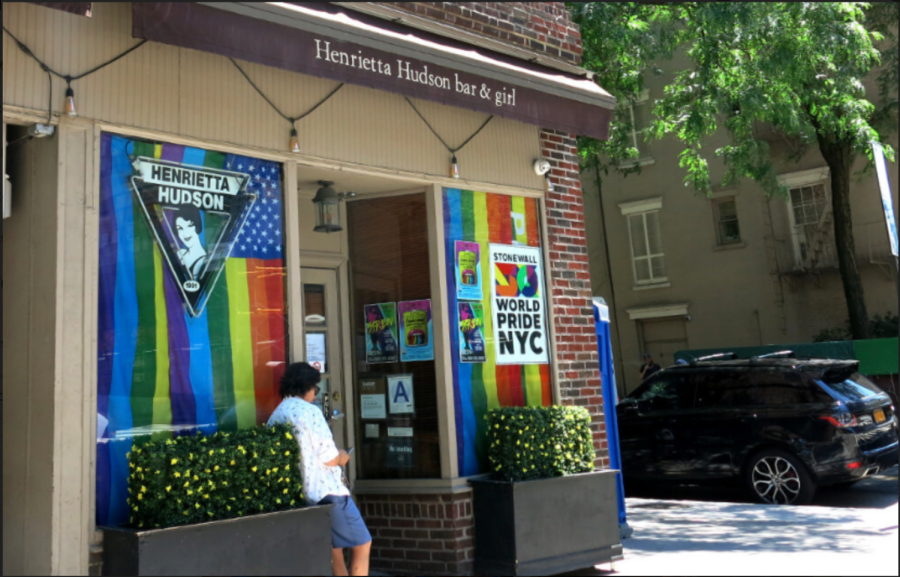The Importance of Queer Women’s Spaces
A walk down Christopher Street, a peek into the dive bars in Park Slope or the pride flags adorning the windows of the restaurants in Hell’s Kitchen would give one the impression that the LGBTQ+ community in NYC is vibrant and thriving. This initial impression can be deceiving, though, as only three bars in New York City are publicly regarded as being catered towards the “L” in LGBTQ+, creating difficult questions of representation, right to space and queer women’s visibility in a larger society.
A Friday night at Henrietta Hudson, a bar no bigger than a Fordham dorm room, means a line down the street, women, non-binary people and trans people huddle together, sharing laughs and cigarettes as the latest from Lady Gaga echoes out the windows. For queer women, the atmosphere is safe and inviting. Free from glaring stares and hypersexualization, this small, almost unspectacular-looking brownstone bar is a haven for lesbians to enjoy themselves. Henrietta Hudson is a bar built by lesbians that intends to serve all people of any gender identity. Thirty years of business has seen several rebrandings and remodelings but not a closure until the COVID-19 pandemic. Today, the bar remains one of the premier locations for queer nightlife in New York City. In addition to being a bar, Henrietta Hudson also prides itself on being a cultural space and holds watch parties of the lesbian TV show “The L Word” and so-called “dyke karaoke.”
One could say that, in comparison to the entirety of the country, New York City is a relatively accepting place for lesbian women. However, Henrietta Hudson, Ginger’s and Cubbyhole are the only three well-known spaces for queer women in New York City. Still, all three are open and accepting of any and all gender and sexual identities.
In 1980, there were an estimated 200 lesbian bars in the country. Now there are only 21. Luckily, one NGO refuses to let the lack of lesbian bars in the United States be a silent issue. The Lesbian Bar Project was created in 2020 to bring awareness to the rapid closure of spaces for queer women across the country. Well-known queer advocates, such as Lea Delaria and Erica Rose, came together to create this organization to support the remaining bars and encourage the creation of new ones.
In 2020, the project organized a four-week fundraising campaign that raked in over $117,000, which went to support the remaining lesbian bars. In 2021, The Lesbian Bar Project released a short documentary detailing the struggles that lesbian bars have gone through during the COVID-19 pandemic, a phemonenon that threatened an already at-risk community.
The 21 remaining bars raise important questions about the inclusion, diversity and visibility of queer women in larger spaces. We have had our relationships sexualized and accepted only through the narrow lens of the male-dominated porn industry. We have had our relationships belittled, reduced to “gal-pals,” “sisters” and “best friends” and never recognized or accepted. The few remaining places where our love is normalized and praised are at risk of closing. Queer women should not need to ask for visibility and a safe space. A love that was forced off court records until 2015 does not need to be cast aside, only to be publicly celebrated in 21 places.
The decline in lesbian spaces is not serving the growing number of queer women who are deserving of a community. However, some questions remain as to whether lesbian spaces are as necessary as they once were. In an era where party collectives such as Bubble Tea and Rosa Perreo regularly throw queer women’s events, one can wonder if the decline in explicitly queer women’s spaces is just a sign of a changing party atmosphere.
Although I cannot answer this question on behalf of the entire lesbian community, I will say that under the strobe lights of Henrietta Hudson, watching my friends dance to Dua Lipa’s “Levitating” unafraid and proud of their identities and seeing older and younger queer women come together to celebrate who they are, it’s clear spaces like these are not only essential, but deeply transformative as well.









































































































































































































